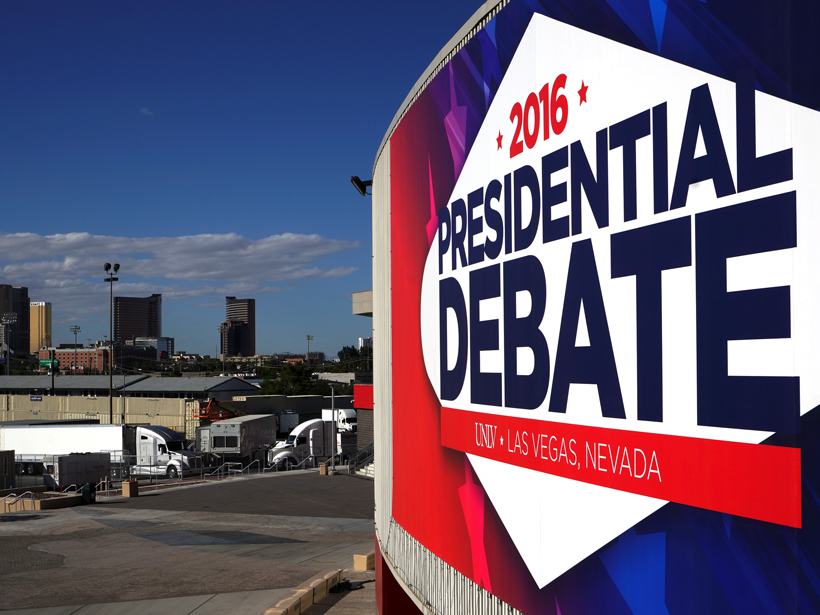The combined 325 seconds spent on climate change so far during the first two presidential debates falls far short of what such a major issue deserves, according to environmental groups and scientists who study physical and social aspects of climate. With just one debate left, to take place in Las Vegas, Nev., tomorrow night, activists have been mounting petition drives, and some scientists are calling for more attention to climate in the final event.
Republican candidate Donald Trump has called climate change “a hoax” created by the Chinese to make U.S. manufacturing noncompetitive. At an 11 October rally in Florida with former Vice President Al Gore, Democratic candidate Hillary Clinton called climate change “one of the most important issues at stake” in this election.
“A Disservice to Voters”
Las Vegas “is the last opportunity for the moderators to ask the candidates for their plans to deal with climate change.”
More than 150,000 people have signed a petition from the Washington, D. C.–based League of Conservation Voters, an environmental organization, asking moderators to include questions about climate change in the upcoming debate. Las Vegas “is the last opportunity for the moderators to ask the candidates for their plans to deal with climate change, and we hope they will take it,” Seth Stein, the league’s national press secretary, told Eos.
Debate topics that moderator Chris Wallace of Fox News announced on 12 October don’t yet include climate change. However, a question about steps the next president should take to address climate change received the fourth highest number of votes among those submitted to the Open Debate Coalition, a nonpartisan group crowdsourcing questions that moderators consider.
People should contact Wallace before the debate, urged Brant Olson, executive director of ClimateTruth.org, a nonprofit based in Oakland, Calif. Climate change “has been virtually ignored in the first two presidential debates, which is a disservice to voters—especially young people and those who are already feeling the effects of drought, flooding, and other climate-related impacts,” said Olsen, whose group collected over 15,000 signatures calling for a debate question about climate.
Dominique Browning, senior director of Moms Clean Air Force, said “it is a disgrace” that there has been no serious discussion of climate change. The group, a special project of the New York City–based nonprofit Environmental Defense Fund, collected nearly 9000 signatures to get a climate question into the debate. “Democracy does not work if media don’t do the job of helping to inform the public on important issues,” she said.
Yesterday the New York Times reported that a climate change question topped a list of queries for Hillary Clinton and Donald Trump that its readers deemed the most important. Of 15 topics that Times editors offered readers to choose from, the most popular among the 90,000 readers who responded to the list was “It is widely accepted scientific fact that climate change is real and potentially catastrophic. What specific action will you take in the next four years?” The Times posed its three most popular questions to Clinton and Trump and published their answers in the article, which was updated to include both candidates’ answers.
Climate Change “Not a Political Issue”
“There is no debate that the planet will continue to warm with business as usual.”
Tom Karl, the recently retired director of the National Oceanic and Atmospheric Administration’s National Centers for Environmental Information, told Eos that an outcome he wants from the debate is “improved awareness that [climate change] is not a political issue, but a science and technology issue that will increasingly adversely impact our socioeconomic and health systems.” Because climate change “affects every living thing on the planet, it is critical that the public understands that there is no debate that the planet will continue to warm with business as usual, with many changes in the weather that we have never witnessed,” he said.
Ed Maibach, a social scientist who directs the Center for Climate Change Communication at George Mason University in Fairfax, Va., said a spring 2016 poll by the center and the Yale Program on Climate Change Communication found that voters are more likely, by more than a 3 to 1 margin, to support a candidate who supports taking action on climate change. “Given the magnitude of the threat posed by climate change, it obviously has not received adequate attention in the debates—or even in the postconvention campaigns,” he said.
However, not all activists and climate scientists regard the upcoming debate as a promising opportunity to discuss climate change.
“In an ideal debate, where the two sides actually present facts to support their arguments, I would love to see climate change at the center of the discussion,” said Steve Valk, communications director for Citizen’s Climate Lobby, a nonpartisan advocacy organization based in Coronado, Calif.
Richard Alley, a geosciences professor at Pennsylvania State University in University Park, questioned whether a meaningful debate could occur in a time-restricted environment. “A serious debate that takes the reality of the good we get from the energy in fossil fuels and the very clear knowledge of a social cost of carbon—we are hurting ourselves and our economy with our CO2 [carbon dioxide]—…could be very revealing and important,” he added. “But it is not especially revealing unless there is some agreement on reality.”
—Randy Showstack, Staff Writer
Editor’s Note: This story has been updated to include information about a New York Times readers poll that ranked a question about climate as the most important to ask presidential candidates.
Correction, 19 October 2016: An earlier version of this article gave an incorrect name for the university at which today’s presidential debate is scheduled to take place. The article has been updated with the correct name.
Citation:
Showstack, R. (2016), Scientists, activists call for climate topic in Wednesday’s debate, Eos, 97, https://doi.org/10.1029/2016EO061417. Published on 18 October 2016.
Text © 2016. The authors. CC BY-NC-ND 3.0
Except where otherwise noted, images are subject to copyright. Any reuse without express permission from the copyright owner is prohibited.

